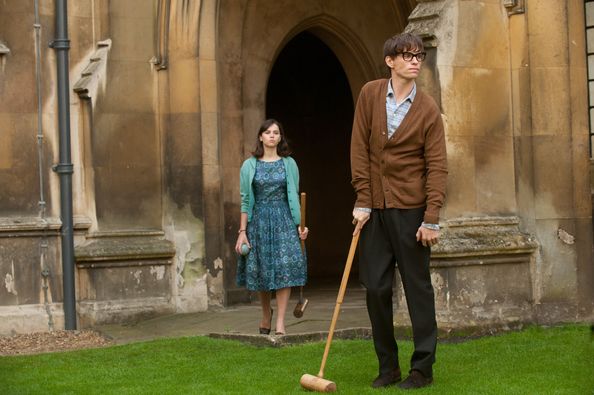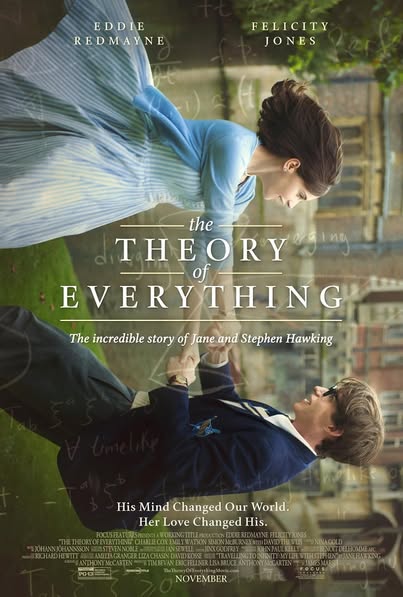The Theory of Everything (2014)

The Theory of Everything is a 2014 biographical romantic drama directed by James Marsh, based on the memoir of Jane Hawking, Travelling to Infinity: My Life with Stephen. The film provides an intimate portrayal of the life and achievements of renowned physicist Stephen Hawking, focusing not only on his groundbreaking scientific contributions but also on his personal struggles and relationships.

The narrative begins in the 1960s at the University of Cambridge, where a young Stephen Hawking (Eddie Redmayne) is a promising astrophysics student. He meets Jane Wilde (Felicity Jones), a literature student, and the two quickly develop a deep romantic connection. However, their lives take a dramatic turn when Stephen is diagnosed with amyotrophic lateral sclerosis (ALS), a motor neuron disease that progressively paralyzes him. The film explores how this diagnosis affects both Stephen and Jane, highlighting their dedication to each other as they navigate the challenges posed by his illness.
Eddie Redmayne’s performance as Stephen Hawking is a standout aspect of the film, earning him an Academy Award for Best Actor. Redmayne’s portrayal captures the complexities of Hawking’s character, from his wit and intelligence to his vulnerability and determination. He skillfully depicts the physical transformations caused by the disease, immersing the audience in Hawking’s experience. Felicity Jones also delivers a powerful performance as Jane, portraying her unwavering support for Stephen while grappling with the emotional toll of his condition.
The film effectively balances the personal and the scientific, illustrating how Hawking’s illness did not deter him from pursuing his groundbreaking research in cosmology. His work on black holes and the nature of the universe is seamlessly integrated into the narrative, showcasing his brilliance and resilience. The depiction of Hawking’s scientific achievements serves as a backdrop to the emotional journey of the characters, reinforcing the idea that love and intellect can coexist even in the face of adversity.

Visually, The Theory of Everything is beautifully crafted, with cinematography by Benoît Delhomme that captures the essence of the settings, from the vibrant life of Cambridge to the intimate moments shared between Stephen and Jane. The film’s pacing allows for both tender and poignant scenes, creating a rhythm that resonates emotionally with the audience.
Thematically, the film explores subjects such as love, loss, and the indomitable human spirit. It delves into the complexities of a relationship strained by illness, as Jane’s sacrifices and Stephen’s relentless pursuit of knowledge highlight the duality of their experiences. The film also addresses broader themes of hope and perseverance, illustrating how passion and determination can transcend physical limitations.

Upon its release, The Theory of Everything received critical acclaim, particularly for its performances and emotional depth. It was nominated for several Academy Awards, including Best Picture, further solidifying its impact as a significant biographical drama. The film not only honors Stephen Hawking’s legacy but also pays tribute to the strength and resilience of those who support individuals facing chronic illnesses.
In conclusion, The Theory of Everything is a poignant and inspiring film that beautifully portrays the life of Stephen Hawking and the love story between him and Jane. With its compelling performances, rich thematic content, and stunning visuals, the film stands as a testament to the power of love and the human spirit in the face of adversity. Whether viewed for its scientific insights or its emotional depth, The Theory of Everything leaves a lasting impression, encouraging viewers to reflect on the complexities of life, love, and the pursuit of knowledge.











